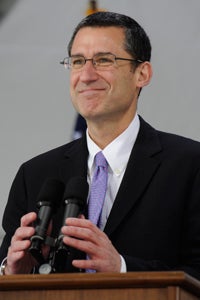Professor William Rubenstein ’86, the Sidley Austin Professor of Law, is this year’s winner of the prestigious Albert M. Sacks-Paul A. Freund Award for Teaching Excellence, an honor bestowed each spring by the Harvard Law School graduating class. The award recognizes teaching ability, attentiveness to student concerns and general contributions to student life at the law school.
Rubenstein, who specializes in civil procedure, complex litigation, and legal remedies, spoke about the students’ role in justice and the capacity of the law.
“We can use our skills as attorneys to reduce human suffering,” said Rubenstein. “As you leave here, I hope you remember the powerful potential attorneys possess … to bring justice into the world.”
In her introduction, Class Marshal Tareah Ekemele Ikharo described Rubenstein as one of the most beloved professors at HLS. According to Ikharo, Rubenstein has the ability to spur his students’ “thirst for learning,” and to make civil procedure, a course not often on the short-list of favorites, incredibly interesting.
Rubenstein, a 1986 graduate of the law school, said he was especially honored to receive this award because it was Harvard Law faculty who inspired him to become a professor. He cited current Dean Martha Minow as being foremost among his “wonderful role models.”
Rubenstein said when he arrived at the law school in the early 1980s, he sometimes questioned why he was bothering to study law. Many of his close friends were dying from a disease that would be known as AIDS. As a gay man, he said he operated under the assumption that he would likely be infected and didn’t have much time to live.
“In the midst of a plague, I turned to the law,” said Rubenstein. “I turned to the law because the law’s promise was that it too could ameliorate human suffering.”
After law school, he said, he took a job at “the margins of the legal profession,” choosing to dedicate his abilities to protecting the rights of people with AIDS. Rubenstein worked for nearly a decade at the national office of the American Civil Liberties Union, litigating sexual orientation and AIDS discrimination cases in federal and state courts throughout the U.S. He published the first law school casebook in the sexual orientation field and co-authored “The Rights of People Who are HIV Positive,” which received the 1997 American Bar Association Certificate of Merit.
In the 1990s, he began teaching civil procedure at Stanford. “It turns out, I loved it,” he said. According to Rubenstein, teaching civil procedure has been the “single most enjoyable professional pursuit” he has had in his life. “I primarily enjoy the experience of working with such enthusiastic and brilliant students at this formative moment in their careers. It is a gift that you all give to me.”
Rubenstein is the author, co-author, or editor of four books and dozens of scholarly articles and shorter publications, most of which concern various aspects of complex litigation. His work has been widely published in leading law journals including the Yale Law Journal, New York University Law Review, the Vanderbilt Law Review, and the Georgetown Law Journal. He has published numerous op-ed pieces in The New York Times, The Washington Post, and scores of other newspapers and legal magazines throughout the United States. He has also litigated, and served as an expert witness.
As a result of his experience and expertise, Rubenstein was chosen to be one of the advisers on the American Law Institute’s effort to re-think class action law, the Project on the Principles of the Law of Aggregate Litigation. He is also the co-chair of the Class Action Subcommittee of the Mass Torts Committee of the ABA’s Litigation Section.
Rubenstein holds a B.A. from Yale College in addition to his J.D. from HLS. After graduating from law school, he clerked for the Hon. Stanley Sporkin, U.S. District Court, Washington, D.C.
Established in 1992, the Sacks-Freund award is named in honor of the late Harvard Law School Professors Albert Sacks and Paul Freund. Recent award winners have included Jon Hanson, Michael Klarman, Elizabeth Warren, Robert Bordone, Richard Fallon, Martha Minow, William Stuntz, Laurence Tribe and Lani Guinier.
